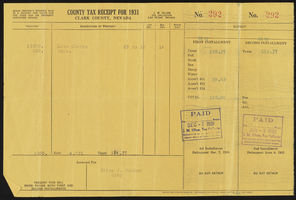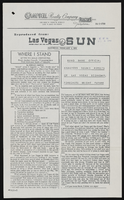Search the Special Collections and Archives Portal
Search Results

Alber A. Mora oral history interview: transcript
Date
Archival Collection
Description
Oral history interview with Alber A. Mora conducted by Rodrigo Vazquez and Laurents Bañuelos-Benitez on December 7, 2018 for the Latinx Voices of Southern Nevada Oral History Project. Alber Mora talks about his life growing up in Cuba with his family and the circumstances of their departure from the country; his brother faced pressures to join the military, which led the Mora family to immigrate to the United States by way of a fishing boat in 1994. Alber discusses the family's lives in Houston, Texas and how he met and married his wife, Rosemary, before the couple moved to Los Angeles and Alber began working at Porto's Bakery, a famous Cuban eatery in L.A. Alber shares how he and his wife eventually moved to Las Vegas, where he works for Caesar's Palace and for the Culinary Workers Union as a Shop Steward.
Text
Stuart and Flora Mason Photographs
Identifier
Abstract
The Stuart and Flora Mason Photographs (1940-1999) contain photographs of hotels, casinos, and other buildings constructed by Taylor International Corporation, which was owned by the Mason Family. The photographs depict the Aladdin, Venetian, Tropicana, Riviera, MGM Grand, and International hotels and casinos in Las Vegas, Nevada. The photographs also depict buildings in Miami and Coral Gables, Florida, and San Juan, Puerto Rico.
Archival Collection
University of Nevada, Las Vegas Lied Library Architectural Records
Identifier
Abstract
The University of Nevada, Las Vegas Lied Library Architectural Records (1965-2010) are comprised of drawings and documents created by the American architecture firms of Welles Pugsley Architects and Leo A Daly Architects, as well as their associated consultants, engineers, and other professional collaborators. This collection documents the design and construction of Lied Library at the University of Nevada, Las Vegas (UNLV). The materials feature both hand-drawn and computer generated architectural drawings, ranging from preliminary sketches and artist renderings to schematic drawings and construction documents.
Archival Collection

Marc Franco Casibang oral history interview: transcript
Date
Archival Collection
Description
Oral history interview with Marc Franco Casibang conducted by Catherine Mariano on December 5, 2021 for Reflections: The Las Vegas Asian American and Pacific Islander Oral History Project. University of Nevada, Las Vegas nursing student Marc Franco Casibang shares stories of his childhood moving with his family from Cagayan province, Philippines to different locations around the world. After their international travels, the family immigrated to the United States and lived in South Dakota and Maryland before settling in Las Vegas, Nevada in 2014 when Marc was a high school sophomore. Marc Casibang discusses his experiences as an immigrant in America, learning English and adapting to the culture of the United States, and maintaining his Filipino identity. He shares his thoughts on Filipino stereotypes, the community he and his family have found in Las Vegas, his faith, and his educational pursuits to become a nurse.
Text
Virginia Valentine (Nevada Resorts Association) oral history interview conducted by Kelliann Beavers and John Hudak: transcript
Date
Archival Collection
Description
From the Lincy Institute "Perspectives from the COVID-19 Pandemic" Oral History Project (MS-01178) -- Business interviews file.
Text

Stewart family real estate tax records
Date
Archival Collection
Description
Stewart family real estate tax records
Text



